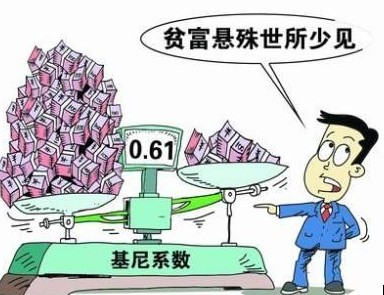In today's podcast, new figures show that inequality of incomes dropped slightly in 2014, according to China's official statistics bureau.
根據(jù)國家官方數(shù)據(jù)統(tǒng)計局的數(shù)據(jù),2014年的收入不公狀況有所下降。

The commonly used Gini coefficient, which measures income inequality, has lowered to 0.469, a figure whichstill paints a picture of a gap that could have large social consequences. Zero on the index represents complete equality of income, while the figure of one stands for total inequality. While last year's dip was an improvement from the 2013 figure of 0.473, the "red line" of 0.40 is considered by some international academics to be the limit for a predictor of social instability. The National Bureau of Statistics said thedevelopment coincided with policies to address the gap between urban residents and rural farmers. But someexperts have cited peculiarities in official poverty measurements, given disproportionate and inaccurate representation by high-income families. Critics say that there is a high likelihood of reporting flaws by the ultra-wealthy both in terms of income sources and amount. Between the years of 2004 to 2012, the NBS stopped releasing the Gini coefficient altogether, but then stirred controversy when it released the previous decade's figures in 2013.
我們通常使用的基尼系數(shù),是一種衡量收入不平均的指標,這一指標下降了0.469,這一數(shù)據(jù)顯示我國還有明顯的收入差距,這也將影響到社會的發(fā)展。這一指標如果歸零,那么就意味著收入平均,如果數(shù)據(jù)顯示為1,那么就意味著收入不平均。去年的數(shù)據(jù)比起2013年的0.473有了好轉(zhuǎn),國際學者認為0.40是這一數(shù)據(jù)的紅線,這就意味著社會的不穩(wěn)定性。國家統(tǒng)計局認為發(fā)展要與政策同步發(fā)展,這樣才能解決城市居民與鄉(xiāng)村居民收入差距問題。但是許多專家對扶貧措施提出了異議,高收入家庭在數(shù)據(jù)顯然并不正確。評論家認為在報道收入和總數(shù)上都富裕的家庭很有可能出現(xiàn)了錯誤。在2004年到2012年之間,國家統(tǒng)計局停止了基尼系數(shù)的公報,但是當統(tǒng)計局在2013年發(fā)布上個十年的統(tǒng)計數(shù)據(jù)時又引起了人們的熱議。
In December 2012, a study by the Southwest University of Finance and Economics estimated China's national Gini coefficient that year to be 0.61.
2012年12月,東南財經(jīng)大學的一項研究表明中國的基尼系數(shù)在那一年是0.61.
For Caixin Online, this is Diana Bates.
這是戴安娜·貝茨為您帶來的財新網(wǎng)。
譯文屬可可英語原創(chuàng),未經(jīng)允許,不得轉(zhuǎn)載。











